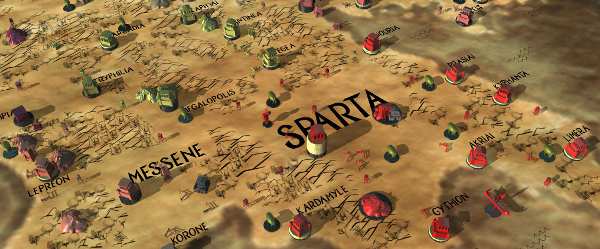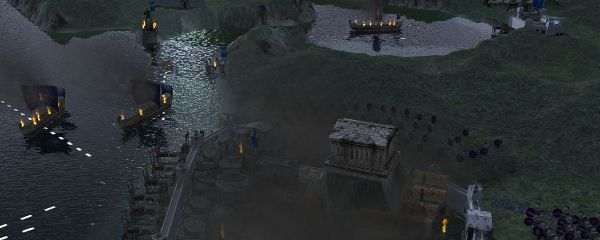Great Expectations: Hegemony Interview
After giving some first impressions of Hegemony: Phillip Of Macedon I started interviewing Longbow Games' Rob McConnell. Now, with the game just appearing on Impulse and being available for a tenner over this weekend's bank-holiday sale, I suspect it's time to present the results. In the form of an interview. Like so...
RPS: can we go back to the origins of Phillip? Why did you want to do a game about the growth of Macedon? What was the key ideas in the game back then?*
Rob McConnell: I believe Jim [McNally, Longbow President - Ed] became interested in Philip while researching Alexander the Great and discovering that it was actually his father who had developed the troop types, tactics and infrastructure that enabled Alexander's invasion of the Persian Empire. Being an avid wargamer, Jim recognized the potential of translating Philip's rags to riches story into a game and formulated the first drafts of the "Philip Project" along with Seumas [McNally, the sadly departed founder of Longbow, who the IGF Grand Prize was renamed in his honour - Ed] in the late nineties.
The clearest things I remember from when Jim first described the project to me was that it was going to be on a grid and he wanted to focus on logistics. It was a pet peeve of his that most wargames would allow you to move large armies without any consideration towards supplying them. He thought this was particularly inaccurate in Greece where the terrain is so restrictive. Amusingly, our arcade game Vortiball was originally inspired by Jim experimenting with octagonal grids for the "Philip Project".
RPS: The idea goes back further, but the origins of working on it was Six years ago. Care to talk about the progress across those years? How did the ideas develop and shake down?
Rob McConnell: It has been quite the journey since we started working on Hegemony. As I mentioned earlier it started as a grid based game but we overlayed that on a 3D map since LDA had developed a reputation for terrain engines from Seumas' work on Tread Marks. Pretty early we scrapped the grid and moved to the free movement you see now but it wasn't until about half-way through the project that we added one of Hegemony's most defining features, the transition to the 2D strategy map. It came about as we were looking for ways to let the player get a complete overview of their kingdom and the stylized board game look not only emphasized the important gameplay elemented but really appealed to us as table-top gamers.
Although logistics was a key component since the beginning it took quite a few revisions before we got to what's in the game now. In the earliest version each army would have a tether back to a city which would be responsible for supplying the army. Player's could drag this tether to different cities to change where supply was coming from as well as plot waypoints like you can with supply lines now. We also experimented with a version where a grid was overlaid over the map and each square was flagged as being in or out of supply depending on whether there was a continuous path from the grid square back to a city.
On the art side, we went through quite a few changes both for gameplay and to keep up with changing tech. At various points in time, Hegemony used pre-rendered sprites, morphed meshes and key-framed skeletons to display units. When discussing how much we've scrapped over the years we frequently joke that the current hoplite model is labelled as version 12. We've also upgraded all the buildings, vegetation and water at least a couple times since we started.
RPS: What do you think the key core of the game? What initially interested me is how it works with its rolling objectives as you spread across the map, which turns it into a very unusual sort narrative campaign. As in, by exploring the map, you get a series of short-form objectives.
Rob McConnell: I think what sets Hegemony most apart from other strategy games is the seamless campaign, the focus on logistics and, as you mentioned, the historical objectives. A significant part of Jim's desire to make Hegemony was to tell Philip's story and so from the beginning there were plans to include historical markers of some sort to give the player information about Ancient Greece and Philip's campaign. The objective system as you see it today came from concerns that non-wargaming players would feel lost in a completely open world and the fact that Jim got us all World of Warcraft accounts for Christmas one year. Later in the process we tried to emphasize the history with the cutscenes after fears we were throwing too many unfamiliar names and dates at the player. It was a struggle trying to maintain historical accuracy and a compelling narrative while not overly restricting the player but I think we found a unique approach that players seem to appreciate.
RPS: It's also a game which strikes me that it's quite easy to get overwhelmed. That the game doesn't work exactly like a traditional RTS means that I've found myself in a position where I've thought it probably better to just re-start the game than press on. What sort of tactical elements do you think people are overlooking in the game?*
Rob McConnell: The single map and seamless campaign in Hegemony do present new challenges that you don't encounter in other wargames. We've implemented a lot of features to help players manage their growing empire (2D strategy map, alerts and auto-pause, quick selects, etc) but there are definitely some tactics that help.
Combined arms is really important. Phalangites can decimate a battleline of hoplites but their light armour won't hold up against a large volleys of javelins or to catapult fire during a siege. Cavalry is also critical in responding quickly to incursions and in catching prisoners to work your mines. Also, it's important to make good use of your generals. The correct general can double the morale and double the siege power of the unit they're attached to which can easily mean the difference between victory and defeat.
You're never going to have enough troops to defend everything so it's important to pick where you're going to place your defences carefully and consider tearing down the walls of less critical cities to free up the garrisons. Enemy units also tend to attack more in the summer when food is plentiful so plan you're advances carefully and consider keeping more troops on defence when the enemy is most active. Furthermore, winter storms prevent raids from sea so take advantage of this time and use your coastal defenders to expand your territory. And don't forget watchtowers, they can be very useful in providing advanced warning of an enemy attack giving you time to move units into the area.
Finally, don't forget to pause. You can pause at any time and issue all your orders. It's a great way to handle multiple battles at once or to simply take a second to rethink your strategy if things get too hectic.
RPS: What are you most proud of? What's your least favourite part?
Rob McConnell: I think I'm most proud of the fact that we finished the game. None of us had done anything near this scale before and it was quite the learning experience. As others will attest, prototyping parts of a game can be a challenge but getting everything working smoothly together with the polish and performance required for release is exponentially harder. We learned this lesson hard way on Hegemony as we regularly underestimated how much work we had left to do.
The part of the game I'm least satisfied with would have to be unit movement and AI. I think it holds up pretty well compared to the competition but I had more ambitious plans for how individual units would interact which I just didn't have time to implement. AI is something that is never perfect and it's easy to spend an indefinite amount of time on it if you don't draw the line somewhere.
RPS: What's your plans for the future of Phillip?
Our immediate plan is just to support and promote Hegemony. The first update has already gone out to registered customers and we're putting a boxed copy together that should be available later this summer. We're also trying to get a booth together for the Origins Game Fair so anybody near Ohio at the end of June should come by for a visit. Beyond that it is almost certain we'll do a follow up with the Hegemony engine, but as to who might be the subject of the sequel, that's currently a hotly debated topic in the office.
RPS: Thanks for your time.
For this weekend, Hegemony is available for a £9.99 from Impulse. It can also be followed at Longbow's site.



